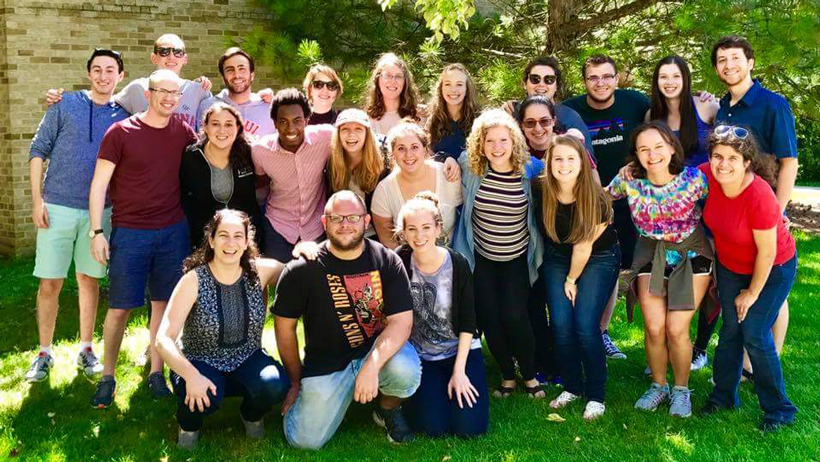עֲבָדִים הָיִינוּ לְפַרְעֹה בְּמִצְרָיֽם עַתָּה בְּנֵי חוֹרִין
Avadim hayinu l'Paroh b'Mitzrayim - atah b'nei chorin
We were slaves to Pharaoh in Egypt - now we are free.
Every year at the Passover Seder we sing this verse. One question -- perhaps the fifth one -- that I'd like to pose this Passover is how do we free ourselves from ourselves? How do we free ourselves when we are the Egyptians and the pyramids are college acceptance or rejection letters?
The celebrity filled college admissions cheating scheme did not surprise me. Actually, it seemed to surprise few people. But why risk jail time to secure acceptances illegally?
As a high school teacher, I see parents incredibly anxious about which colleges their children will attend. The anxiety almost always seems to stem from wanting their children to have the life that they could not have, for whatever reason. Perhaps they couldn't attend a prestigious school because their parents could not afford it. Perhaps their parents didn't value education. Perhaps they did not attend a good high school.
Parents make well-intentioned, but sometimes bad decisions based on the pursuit of the perfect college for their children. They push teenagers into taking advanced classes for which they are not ready, or they demand that their teenagers enroll in as many advanced classes as possible, causing them to suffer emotionally. The latest trend is to demand that teenagers enroll in two math classes simultaneously so that they can take the most advance math class senior year to be more competitive for college. For some students, taking two math courses is a great opportunity; for others, they end up weaker math students because they do not adequately master the skills taught in either course.
Indeed, there is a difference between pushing a child and shoving him. And in my career I've seen far too much shoving.
I once had some students who came into class extremely down after taking a science test. I asked them which science they were taking. They answered. I asked, "Do you think the teacher could better prepare you for tests, or is the class just too difficult for you at this point in your high school career?" Usually, teenagers blame teachers for their failures, but it was clear they had never been asked the latter question.
One student who was brave enough to answer said, "I didn't really want to take this class, but I was told that I would never get into a college unless I took it."
I asked her why she didn't want to take it.
"You need math for this class, and I'm weak at math," she said.
I told her that there may come a day that if she retook the class that she would be able to be successful in it. I explained that it is possible that she simply wasn't ready for the course, but in a couple of years would be.
"But what about college?" she asked.
I suggested she speak to the guidance counselor. However, what I wanted to tell her is that there are about 16,000 universities and colleges in the world. Does every single school require that you take that particular course this particular moment in your life?
The following narrative no longer works for every upper-middle class 21st century student (not that it ever did): you have to push yourself as hard as you can, do as many extracurriculars as you can, be good at everything you do so that you will get into a good college and get a good job. This formula just doesn't work for many kids, and in fact stunts them; when a teenager is not allowed room to breathe by his parents, he may require a ventilator for many years to come.
So how do we free ourselves from this narrative? It starts with scheduling for the 2019-20 school year.
- As a parent, ask yourself - Is what I'm doing for me or my child? Am I projecting, or is this really the best scenario for my child?
- Do I need so much control over my child's course selection?
- Am I really listening to what my child wants and needs?
- What does my child enjoy? How will these courses affect her joy to stress ratio?
- Are my child's teachers and counselors sending a consistent message, and am I ignoring it? If so, why?
- The best indicator of future behavior is past behavior. How has my child succeeded in advanced courses in the past?
- Is my child currently suffering from emotional issues exacerbated by stress? Will too many advanced classes negatively affect her mental health?
I hate to see families unnecessarily stressed because of academics in high school.
One last challenge to adults: when you see a high school senior out and about or at your seder table, ask them five questions before asking where he/she is going to college. This demonstrates to young people that they are more than the school into where they were accepted, and that you genuinely care about them. Here are some suggestions:
- Have you had a good senior year?
- Did you enjoy high school?
- How is your family?
- What are you looking forward to over the next few months?
- Are you doing anything special this summer?
And maybe, just maybe, you won't even need to ask.
Sharna Marcus teaches English and History at the American International School in Israel and spends her summers in Chicago.
Read more stories in the "Why We Retell the Story" Passover blog series at oychicago.com/Passover .









.jpg)



